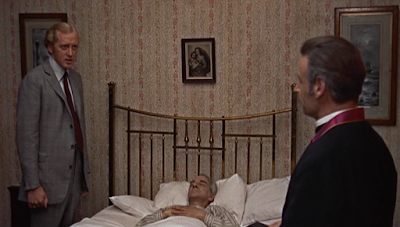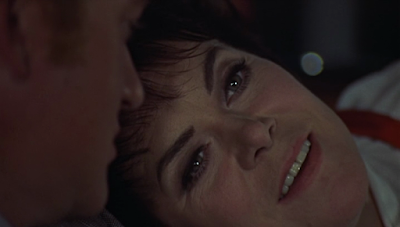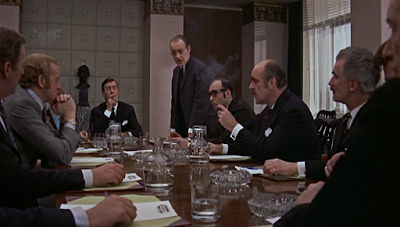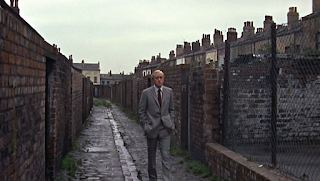The more things change the more politics stays (roughly)
the same. This examination of the politics of ambition versus conviction, still
strikes many a chord today after the fall of the centrist Labour movement and
its still surprising replacement by the more overtly left-wing leadership of
Jeremy Corbyn and the Momentum movement. Who knows where this will lead us but
there are still plenty of men like Peter Finch’s MP Johnnie Byrne in all
parties.
No Love for Johnnie
was based on a novel by Wilfred Fienburgh who was not only a Labour MP from
1951 until his death in 1958 but was also described as “rather louche” by
Anthony Howard and, according to Denis Healey, a man whose “good looks and big
brown eyes often led him astray…” It’s hard not to conclude that his books
contained at least some autobiographical references.
Johnnie Byrne is a charismatic MP on the rise… a new
breed of politician who gives good copy and seems to represent the future of a
party that could sense election victory as the Tories ran out of ground.
Johnnie is a man who places his own interests ahead of his constituents, party
and even friends and lovers. Johnnie is left of centre and is married to Alice
(Rosalie Crutchley) a former member of the Communist Party, a situation that
has held back his rise in the party.
 |
| Rosalie Crutchley |
After a Labour victory, Johnnie must face the
disappointment of being overlooked for a cabinet post and then coming home to
find Alice has had enough and wants to leave him. The film is balanced between
his desire to be loved by the party and its electorate as well as his need to
replace Alice’s loving stability. Johnnie needs to decide what he wants the
most and stumbles about for much of the film.
A young neighbour, Mary (Billie Whitelaw), who has
obviously held a candle steps in to help and soon she is comforting Johnnie as
he drowns his sorrows. The phone rings and Johnnie choses to answer it rather
than focus on the girl in hand, gifting Mary the realisation that this guy will
always jump at the political chance.
 |
| Billie Whitelaw |
Despite this, Mary invites Johnnie along to a party
hosted by the immaculate Sheila (the brilliant Fenella Fielding – still wowing
us in her 90s!) where he meets an attractive young model, Pauline (played by the delicious Mary
Peach). The following day he tracks Pauline to a photographer’s studio run by a
chap named Flagg (the singular Dennis Price – what a cast this film has!) and
pretends he has bumped into her by accident…
Meanwhile, Johnnie is being lined up as a stalking horse
by a group of left-leaning MPs concerned at their new PM’s direction. These
include Donald Pleasence as Roger Renfrew, Peter Sallis and Mervyn Johns as
Charlie Young with the Prime Minister being played by Geoffrey Keen. They
arrange for Johnnie to raise an awkward question about overseas aid at Question
Time and as the in-fighting progresses, wise old-head Fred Andrews (Stanley
Holloway on fine form; what a range he had), reminds Johnnie of his parents’
principles and their role in keeping the party together.
 |
| Mary Peach |
The day arrives, and Johnnie is nowhere to be found… as
the House of Commons prepares itself for the showdown he is in bed with Pauline
finally consummating their relationship at precisely the time when he should
have been standing up for his party’s values. But even as he seduces Pauline he
begins the process of losing her as he overburdens the 20-year old with his
42-year old desire to settle down.
Back in Parliament he’s spurned by his co-conspirators
and Renfrew exacts revenge by fixing for his constituency party to call him up
north for a vote of no confidence. For the first time we see him squirm and
lose confidence as the real passion of his comrades reveals his smooth talk as
hollow and he just about survives the vote.
Meanwhile Pauline has gone missing and there are pitiful
scenes with Mary who refuses to be his fall-back… he’s nothing without a woman
it seems.
Spoilers: But,
if a week is a long time in politics, these few days offer Johnnie a way back
as a now grateful PM offers him a chance of promotion after the tragic
resignation of a junior minister. Free of his wife with her troublesome past
he’s now a player with a future, only Alice returns and he’s going to have to choose…
Dusty verdict:
No Love for Johnnie may have its period charms but it’s a timeless play on
politics, power and passion. Ralph Thomas directs a wordy script well and uses
a quite splendid cast well.
Johnnie’s women are superb, especially Billie Whitelaw
who can match Finch’s intensity. Mary Peach is well cast as Johnnie’s beautiful
but unsuitable young love and against Finch’s worldly-wise and conflicted
character she appears every inch the unformed girl who could not possibly
commit to loving such a shadowed soul.
Finch won a BAFTA for the role and its easy to see why.
He’s on screen for virtually the whole film and manages to make you care for
this ultimately feckless chancer: he truly is Johnnie.
It’s now available on DVD from those Amazon people and
makes for gripping viewing in these strange times…
 |
| Oliver Reed pops up at the party as Fenella and Peter negotiate |






















































